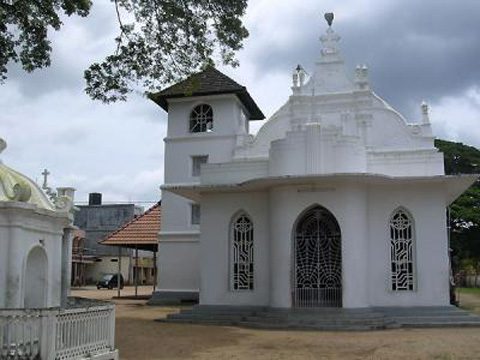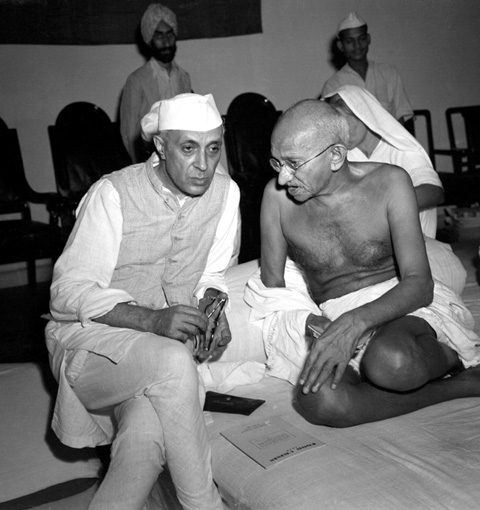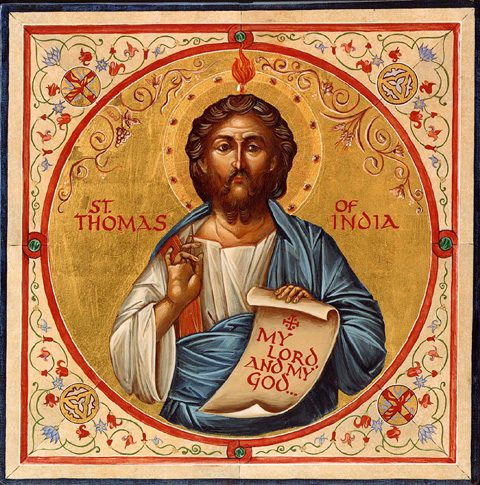What would Gandhi do?
Hindu extremists recently dragged several new Christian converts from their homes in Assam, India, beat them and threatened them for five hours, trying to get them to renounce Jesus. When finally released, the shaken converts did not go home, but instead sought comfort in the homes of fellow Christians, who stayed up all night praying with them, counseling them and praising God.

Praising God? That is an odd response when fanatics have promised to return the next day – with an ultimatum to give up one’s beliefs or die. Yet, incredibly, these Christians in India take very seriously the words of Christianity’s Apostle Paul – who warned of such persecution – and also the counsel or the founder of modern India, Mohandas Gandhi: “Fear of death makes us devoid both of valor and faith. For want of valor is want of faith.”
On another occasion, the leader who many Indians refer to reverently as “Gandhiji” or “Gandhi the Great” said: “Where love is, there God is also.”

They are also taking very seriously Matthew 5:11-12, in which Jesus says His followers are to consider themselves greatly blessed when people insult, persecute and falsely say all kinds of evil against them because of their faith in Him.
Of India’s 23 million Christians, 2.7 million live in four states where Christian persecution is increasingly common: Karnataka, Andhra Pradesh, Madhya Pradesh and Chhattisgarh – however, this incident is particularly disturbing because it took place in the state of Assam.
The next day, the extremists made good on their threats and returned. They searched for the Christians from home to home in the village, then beat them publicly – this time vowing to attack local churches and kill the converts’ new Christian friends, who are not foreign missionaries but Indian neighbors and co-workers.

Christianity is India’s third-largest religion. The faith was brought to the subcontinent by the Apostle Thomas, who arrived in Kerala in 52 a.d. to spread the Gospel first among the Jewish settlements. Christianity was well-rooted in India by the 3rd century, even before it spread to some nations of Europe.
Nevertheless, the majority religion is Hinduism.
In the recent incidents, the Hindu extremists offered a simple solution: the Christian converts could return to Hinduism by participating in a ceremony at a local temple.
Citing Gandhi, the new Christians refused. “Religion is a matter of the heart,” he once proclaimed. “No physical inconvenience can warrant abandonment of one’s own religion.”
He also wrote: “Are creeds such simple things like the clothes which a man can change at will and put on at will? Creeds are such for which people live for ages and ages.”

One cannot give up the truth when faced with ridicule or public humiliation, Gandhi taught: “An error does not become truth by reason of multiplied propagation, nor does truth become error because nobody will see it.”
Using modern technology, India’s Christians have written to friends throughout the country as well as to outside groups such as Compass Direct, International Christian Concern, Voice of the Martyrs and Open Doors. Their plight has become of enormous concern to millions of Christians worldwide, who are praying for them. However, the converts have not pleaded for armed intervention – or even for groups of fellow Indian Christians to hurry to Assam to defend them.

Instead, their messages tell of the honor they feel to be treated in the same way as so many great founders of Christianity – and of Gandhi – who himself was martyred by such Hindu extremists for proclaiming such things as:
“Hatred ever kills, love never dies such is the vast difference between the two. What is obtained by love is retained for all time. What is obtained by hatred proves a burden in reality for it increases hatred.”
And: “God is, even though the whole world deny him. Truth stands, even if there be no public support. It is self-sustained. Defeat cannot dishearten me. I know that God will guide me. Truth is superior to man’s wisdom.”
Gandhi’s advice shortly before he was struck down by an assassin’s bullet?
“There are times when you have to obey a call which is the highest of all, the voice of conscience – even though such obedience may cost many a bitter tear, and even more, separation from friends, from family, from the state to which you may belong, from all that you have held as dear as life itself. For this obedience is the law of our being.
How did Gandhi suggest standing up to persecution?
“Intolerance is itself a form of violence and an obstacle to the growth of a true democratic spirit. If we want to cultivate a true spirit of democracy we cannot afford to be intolerant. Intolerance betrays want of faith in one’s cause.”
Gandhi’s dream for India was of a pluralistic society – with Hindus, Muslims, Sikhs, Jews, Christians and Buddhists living side by side in peace on the vast subcontinent. However, history records the violent riots that resulted in the partition of India and the formation of separate Muslim countries that became Pakistan and Bangladesh.

Now, Christians throughout are worrying about Gandhi’s dream. When your family is being driven out of their home because of your faith, it is not easy to rejoice and be glad.
Even so, the Indian Christians tell of finding peace knowing they are fulfilling Jesus’ words that they would be hated, hunted down, persecuted – and forced to leave everything.
Days after the first incidents, a mob from a local Hindu student union, along with extremist Rabha Hindu groups from the towns of Tulsibari and Jharapata, attacked various Christians in Tulsibari, according to a variety of reports.
The extremists dragged Christians out of their homes and forced them to attend a public meeting where the Hindus threatened to expel the new Christians from their homes – or kill them – if they did not denounce Christianity and re-embrace the Hindu gods. When the Christians refused, the extremists beat two of them, including a widow, and tried to force them to sign a blank paper before hundreds of witnesses. The paper would have then been filled in with pledges that would legally reconvert the Christians to Hinduism.
When the Christians refused, they were told they would be forced leave town – leaving behind anything they could not carry with them.

That scene was repeated at Jharapata. A mob stopped 10 newly converted Christians who were returning home from a Sunday worship service, beat them and threatened them for five hours if they did not renounce Christ – and reveal who had led them to become Christians.
What would Gandhi have done?
“The spirit of non-violence necessarily leads to humility,” he once wrote. “Non-violence means reliance on God, the rock of ages. If we would seek His aid, we must approach Him with a humble and contrite heart.”
The recent incidents “are driven by ultra-nationalist Hindus of India’s Bharatiya Janata Party,” writes an Indian Christian, Nirmala Carvalho. But even more disturbing, “in both cases, the police arrested the Christians.”
Apparently forgetting “what would Gandi do,” officials jailed the Christians, not the Hindus.
Police have jailed a number of Christian leaders and sought evidence that they must have bribed or forced the Hindus to convert to Christianity. In the village of Pati near the city of Indore in the Bhalwani district of India’s Madhya Pradesh state, the police arrested a preacher who, as with local practice, uses only a single name, Arjun, along with one of the faithful of his church, named Rakesh. The two were conducting a prayer meeting along with 75 other Christians.
After hours of questioning, police released the three men without filing any charges. A similar episode occurred in nearby Keshavapura after police received complaints from extremists of Hindus becoming Christians. Police arrested a pastor named Manjunath and traveling Christian evangelists named Stella and Bhavani. The three had been distributing leaflets about Christianity at the bus station in the town of Hubli.

According to reports coming out of India, Hindu militants surrounded them, insulted them and snatched the leaflets. Then, the activists took them to the nearby police station, where the Christians were held in custody. Manjunath has been a preacher in the Indian Church of Christ for years and had no police record. However, he and the two evangelists now have been charged under a state anti-conversion law. Madhya Pradesh is one of six Indian states that prohibit anyone to persuade someone else to switch religions. Legislators in Karnataka have been attempting to pass one there as well.
“The Christian community,” says Sajan George, president of the Global Council of Indian Christians, “is even more vulnerable where there are such laws. The ultra-nationalist Hindu groups enjoy the protection of the authorities, and this encourages them to violate every aspect of the life of a Christian, even the most intimate and private.”
The anti-Christian attacks are “shameful” and show “a disturbing pattern: violence and appalling social pressures, to limit religious freedom,” says George, who is a native Indian.
On June 9, forty Hindu radicals broke into the home of Manesor and Mala Rabha, Christian converts. The Global Council of Indian Christians reports the extremists threatened to forcefully reconvert the Rabha family back to Hinduism, but they got away and took shelter in another Christian’s house. Two Christian friends Michael and Prashanto Rabha tried to help — volunteering to guard Manesor and Mala Rabha’s house, but at midnight, armed assailants took the Christians to a village establishment and interrogated them. When they refused to recant their faith, International Christian Concern sources say, the radicals “beat them with their hands, feet and flashlights all the while abusing them with filthy language.”

The extremists tried to force them to sign blank papers that would have been filled in with whatever the extremists wished. When the Christians refused, Michael and Prashanto Rabha were repeatedly kicked and beaten. A blow to Michael Rabha’s left eye with a large flashlight seriously wounded him. Prashanto Rabha was hardly breathing after the assault. The extremists also injured Mala Rabha before releasing the Christians and threatening further violence if the assaults were reported to the police.
The next morning, they were admitted to Satribari Christian Hospital in Assam with serious wounds and complications. While at the hospital, their homes were looted and their cattle stolen.
Now two other families have also fled the village.
Manesor lodged a complaint with the police, asking for an investigation. Now he has received death threats from local extremists. As a result, he and Mala are unable to return home. They fear being beaten once again, this time for reporting the crimes committed against them.
Police have made no arrests.
In Karnataka, police have accused another pastor of forceful conversion after receiving complaints. The Global Council of Indian Christians reported that a policeman visited the church of pastor Manjappa Byadayi from the Salvation Gospel Church and began leveling allegations that there had been many complaints of “conversion activities.”
The officer told them to report to the police station with all information about their activities. Pastor Byadayi and his wife reported to the station, where police accused them of forcible conversion of Hindus to Christianity and told them that they must stop the alleged activity immediately. Officers ordered the Christians to close down their church building and leave the area. They were told that if they did not, they would have to report their activities to the police station daily.
What are Christians doing? Cowering in fear? No, reports say. Services are continuing. A recent sermon centered not on how to barricade one’s house or protect one’s property, but instead how David the Psalmists proclaimed “Sing, O heavens, and be joyful, O earth; and break forth into singing, O mountains: for the Lord hath comforted His people, and will have mercy upon His afflicted.”
Meanwhile in Orissa, armed Hindu extremists attacked an evangelist who goes by the single name of Baidhar in Mitrapur village, seriously wounding him. The Global Council of Indian Christians reported that the extremists attacked Baidhar while he was returning home from a prayer meeting at a Christian’s home in the village.

Baidhar was bleeding heavily when rescued by Christians and taken to a nearby hospital, according to the Global Council of Indian Christians. When the radicals learned that the evangelist had been rescued, about 50 Hindu extremists mounted an attack on 12 Christian families at 8:30 p.m., seriously injuring about 20 of them. They also ransacked their houses and tore the clothes of some of the young women. The Christians approached officials for help, the Global Council reported.
And the reports keep pouring in:
On June 8 in Narayanpur village, South Kamrup, Hindu extremists beat Christians and tried to force them to reconvert to Hinduism. The Global Council reported that the Hindu extremists beat Rabha family members Bharat, Srimanto, Batiram, Matiram, Jyotish and Rubul on the street after dragging them from their homes. The Christians were told to renounce Christianity and to forget about Jesus.
The extremists compelled Hindu villagers to take oaths that no Christians would be allowed to enter or remain in their homes in the village, according to the Global Council. Police have visited the site and registered a report against the attackers. On the same day in nearby village of Deupani, Hindu extremists tried to force Bhageswar, Durgeswar and Rana Rabha to return to Hinduism along with their families after beating them up and looting their properties.
Sources told Compass Direct that the enraged extremists threw Bhageswarn, Rana and Motiram Rabha out of their homes and destroyed the structures as well as their church. The extremists also cut down their vegetation and looted their grains, cattle and poultry. The Christians fled the area in fear.
In Bacheli, Dakshin Bastar, the Evangelical Fellowship of India reported that Hindu extremists disrupted a funeral service and beat Christians resulting in the hospitalization of nine. EFI reported that the extremists, armed with sharp-edged weapons and clubs, shouted anti-Christian slogans as they stormed the funeral attended by about 100 people from the Bastar for Christ Movement Church.
The assailants threatened the Christians and beat them repeatedly. In order to thwart the burial of the deceased, a 19-year-old identified only as Soni, the extremists filled the open grave with dirt. Loved ones later buried the corpse elsewhere after police told them they were unable to provide security for burial in the village. Police registered a report against the attackers, but no arrests were made.
In Beltokri, Gariyaband, about 20 Hindu extremists disrupted the Sunday worship service of an independent house church led by Pastor Ankush Bariyekar. The Evangelical Fellowship of India reported that the extremists suddenly barged in and verbally abused, threatened and beat the Christians meeting in the house of Santosh Sahu. Pastor Bariyekar and another Christian, Ram Sahu, were injured, according to the EFI. The Christians opted to file no complaint.
In Himachal Pradesh, police ordered a pastor to vacate his home and confiscated his ministry identity card after Hindu extremists from the group Rashtriya Swayamsevak Sangh stormed into a prayer meeting he was leading and beat another Christian.
The All India Christian Council reported that about 40 extremists stopped the prayer meeting led by Pastor Jai Masih Topno. When police arrived, they did not arrest the extremists, but took Topno and three other Christians, two women and a man, into police custody.

Police did not file charges against the preacher, but ordered him to vacate his home within two days and leave the area, according to the AICC. Police told Topno he could recover his identity card after he vacated his residence.
Hindu extremists burned a church building in Shelanagar, Vizag. The All India Christian Council reported that the Seyonu Prarthana Mandhiram Church building in Shelanagar was burned after local leaders pressured Christians to vacate the land. Some local leaders, claiming the church land belonged to them, had been pressuring the church to vacate the property. Narendra Babu, the leader of the local leaders, had started fencing the land around the church building to forcibly stake his claim, according to the AICC.
The church pastor filed a police complaint, and two weeks later the church building was damaged in the fire.
The violence continues, virtually ignored by the international press.
Meanwhile India’s Christians ask “what would Gandhi do?”


